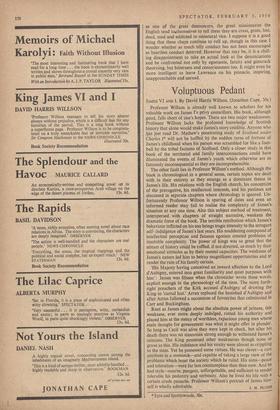Voluptuous Pedant
JAMES VI AND I. By David Harris Willson. (Jonathan Cape, 30s.) Professor Willson is already well known to scholars for his valuable work on James I's privy councillors. His book, although good, falls short of one's hopes. There are two major weaknesses. Professor Willson lacks the profound knowledge of Scottish history that alone would make James's story credible. Anyone who has just read Dr. Mathew's penetrating study of Scotland under Charles J* will not be baffled by the sudden turns of fortune of James's childhood when his person was scrambled for like a foot- ball by the tribal factions of Scotland. Only a closer study in this book of the territorial and family interconnections could have illuminated the events of James's youth which otherwise are as fatuously inconsequential as they are incomprehensible.
The other fault lies in Professor Willson's method. Although the book is chronological in a general sense, certain topics are dealt with in their entirety as they emerge as a dominant theme in James's life. His relations with the English church, his conception of the prerogative, his intellectual interests, and his pastimes are discussed in separate chapters where chronology is ignored. Un- fortunately Professor Willson is sparing of dates and even an informed reader may fail to realise the complexity of James's situation at any one time. Also this subject method of treatment, interspersed . with chapters of straight narrative, weakens the dramatic force of the book. The terrible retribution which James's behaviour inflicted on his son brings tragic intensity to the arrogant self- indulgence of James's last years. His maddening compound of intellectual perception and fatuous egotism created problems of insoluble complexity. The power of kings was so great that the stream of history could be ruffled, if not diverted, as much by their emotional attitudes as by their mental capacities. The weakness of James's nature led him to betray magnificent opportunities and to render the ruin of his family certain.
'His Majesty having conceived an inward affection to the Lord d'Aubigny, entered into great familiarity and quiet purposes with him' : James was fifteen when the chronicler wrote these words, explicit enough in the phraseology of the time. The more forth- right preachers of the Kirk accused d'Aubigny of drawing the King to 'carnal lust.' Arran replaced the banished d'Aubigny and after Arran followed a succession of favourites that culminated in Carr and Buckingham.
Rant as James might about the absolute power of princes, this weakness, ever more deeply indulged, rotted his authority and placed him at the mercy of worthless, rapacious young men whose main thought for government was what it might offer in plunder. So long as Cecil was alive they were kept in check, but after his death there was no statesman strong enough to withstand James's minions. The King possessed other weaknesses though none so grave as this. His indolence and his vanity were almost as crippling to the state. Yet he possessed some virtues. He was clever—a rare attribute in a monarch—and capable of taking a large view of the problems which beset the society which he ruled. His aims—peace and toleration—were far less commonplace then than now. And he had style--coarse, pungent, unforgettable, and sufficient to render tolerable his pedantry and verbosity. Also he lived his life with a certain crude panache. Professor Willson's portrait of James him-
self is wholly admirable. H. PLUMB * Eyre and Spottiswoodc, 30s.


































 Previous page
Previous page